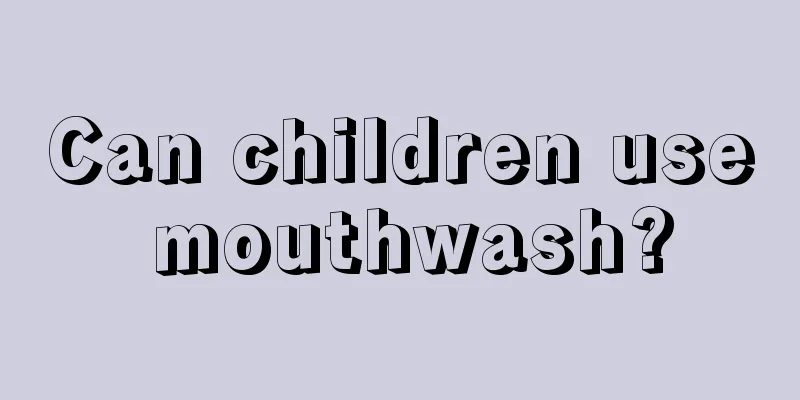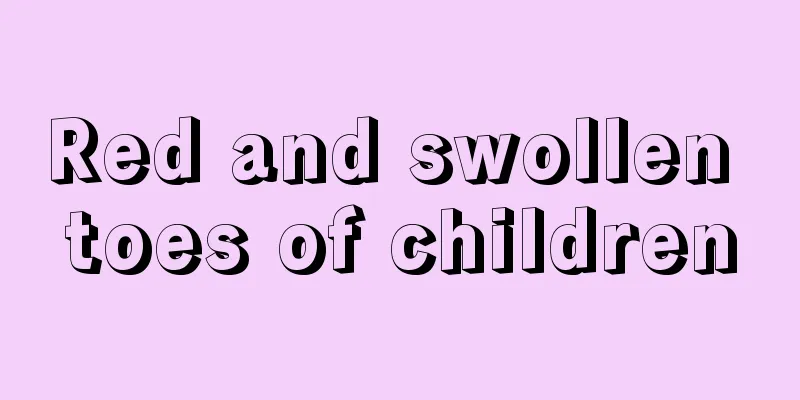Can children use mouthwash?

|
Oral hygiene is very important in daily life. If you don’t pay attention, it is easy to get infected with oral diseases. Mouthwash is a very common oral product in life. Many people like to use it. Regular use of mouthwash can not only clean the mouth, but also prevent many oral diseases, such as caries or periodontitis. It can also keep the breath fresh, which is very good for the human body. However, children are best not to use mouthwash. Can babies use mouthwash? Babies under six years old should not use mouthwash 1. When babies are too young to use mouthwash, they are more likely to swallow it. Swallowing too much mouthwash will endanger the baby's health. 2. Most mouthwashes contain fluoride. Babies under six years old have not yet fully developed their teeth and their oral cavity is more fragile, which can easily cause fluoride poisoning. 3. No brand of mouthwash can replace brushing teeth. Brushing teeth is a well-known oral care method and the most basic and main way to remove dental plaque. During brushing, the toothbrush, with the assistance of toothpaste, removes plaque through physical friction, while mouthwash cannot perform this type of friction. How to protect your baby's oral health (1) Improving the nutrition of infants and young children first requires breastfeeding. Breast milk is the best natural food for babies. It is high in calories and contains various nutrients suitable for the needs and digestion ability of babies. It also contains more enzymes and antibodies, which are beneficial for babies' digestion, absorption and disease resistance. Direct breastfeeding is convenient, hygienic and economical. Secondly, you should also pay attention to the method and time of breastfeeding. Within 3 months after birth, feed the baby every 3 hours, and then every 4 hours. Do not put the nipple or empty rubber pacifier into the baby's mouth to coax the baby when you see the baby crying. The former allows the baby to suck continuously, which not only consumes physical energy, but also restricts the development of the jaw due to the constant contraction of the mouth muscles; the latter constantly inhales a large amount of air, and will compress the upper palate, making the upper palate too large and narrow, and even cause gingivitis. In addition, you should pay attention to the breastfeeding posture and rotate feeding between the left and right sides to avoid affecting the growth and development of the baby's maxillofacial area. Long-term use of sugar-containing bottles for feeding, especially when feeding at bedtime and keeping the baby in the mouth while sleeping, can easily cause caries in the deciduous incisors and first deciduous teeth. Some people call this "baby bottle caries". Last but not least, children should practice chewing as early as possible, because chewing is a physiological stimulation to the jaw, which can promote bone growth and exercise muscle function. (2) To help infants and young children maintain good oral hygiene, parents are required to start early, help, and educate. Oral hygiene should be started before the baby's deciduous teeth erupt. It is best for the mother to use her fingers wrapped with sterilized gauze to gently wipe the gums and palate after breastfeeding and every night. And remember to drink a small amount of warm water after eating to clean your mouth. Children should be taught to brush their teeth at the age of 3, and given guidance and supervision to develop good oral hygiene habits. (3) Have regular oral health checks to prevent dental caries as early as possible. It is required to have regular oral health checks on infants every six months to detect problems at any time and deal with them in a timely manner to facilitate the healthy growth of infants and young children. In order to prevent dental caries as early as possible, it is best to supplement fluoride for babies with fluoride drops. The fluoride drops can be dripped into the mouth of infants and young children, or they can be added to food and eaten. After the age of 3, fluoride tablets can be taken, and fluoride toothpaste containing low concentrations can be used to brush teeth. Supplementary doses of fluoride drops and fluoride tablets should be prescribed by a dentist or used collectively in kindergartens. When the children are 3-4 years old, they can go to the hospital to apply pit and fissure sealants on the surfaces of the upper and lower first and second deciduous molars to prevent caries. |
<<: Sequelae of febrile seizures in children
>>: Is hydronephrosis serious in children?
Recommend
Newborn baby has a lot of mucus? These are probably the reasons
Some mothers find that their newborns have a lot ...
What causes red spots on babies?
What causes red spots on babies' bodies? For ...
Why do babies occasionally twitch?
We all know that taking care of a baby is not an ...
Early symptoms of hydrocephalus in infants
Extracerebral hydrocephalus in infants mainly ref...
Symptoms of parasites in children
Parasites are microorganisms that cannot be seen ...
Baby's eye discharge is yellow and sticky
Newborn babies are relatively fragile in all aspe...
What to do if baby eczema is scratched and bleeds
The chance of skin diseases like eczema occurring...
Is it scary for a newborn to have red scalp?
Why do some newborns have red scalps, unlike othe...
Caring for autistic children should start from these
Every child is an angel in the family, especially...
What to do if baby has dry skin on face
For babies, their skin is more sensitive than tha...
The little bumps on the child's hands don't itch
It is a very common phenomenon for children to ha...
Is it good for children to eat dragon fruit often?
Fruits are divided into warm, neutral and cold fr...
Common childhood diseases
There are many types of common diseases in life, ...
Why does a child cough when lying down?
If a child gets sick with a cold, he or she may h...
What to do if your teeth are loose at the age of 15
It is often said that toothache is not a disease,...









